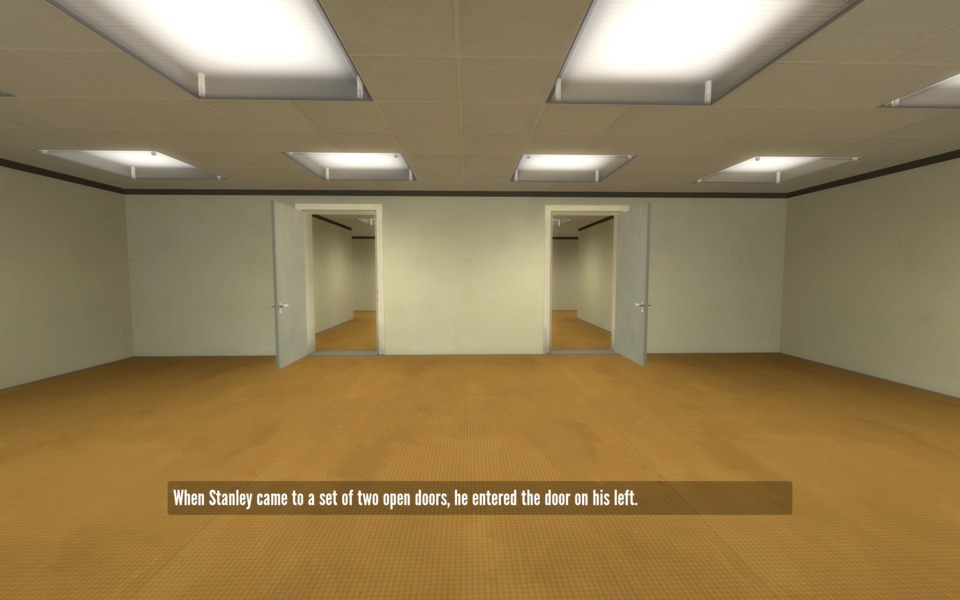
The Stanley Parable is a genius bit of interactive fun that originally started out as a free mod for the Source Engine. It plays around with the concepts of game narration and player choice in some really inventive ways that will likely appeal most to people who enjoy thinking about the nature of games and the push-pull relationship between their creators and their players. But that's really only half the story, if that. The core of The Stanley Parable only works because it's genuinely funny. It's brief, but powerfully effective, with plenty of moments where you think you might have found a situation that the creators didn't account for... only to be proven wrong yet again. Once you've replayed as many different paths as you can think of, there won't be much reason to go back and play it again, but the few hours you'll probably spend with The Stanley Parable are worth its purchase price.
The crux of The Stanley Parable is as follows: The narration will tell you what happens next, and you can either do that thing or, in most cases, do some other thing. Or maybe do nothing. The opening of the game, for example, strongly implies that Stanley--a worker drone who seems to push buttons for a living with next to no authority or autonomy in his job--leaves his office. From there, you can walk out of the office immediately, stick around in the office until the narrator pipes up to account for your complete inaction, or close the door leading out of your office, triggering one of the game's many different conclusions. The decisions spin out from there, rarely becoming complicated but definitely becoming more and more ridiculous. You poke at The Stanley Parable and The Stanley Parable pokes back. Restarting the game--whether that's your decision or the narrator's--is part of the game, and the way the story accounts for and occasionally addresses those restarts helps create some mind-bending twists and turns that blow the logic of the scenario apart in a handful of ways. Are you Stanley? Or are you the player controlling Stanley? Depending on the choices you make, the narrator may address you as either.

Of course, none of this would work unless the writing and narration were able to keep you engaged and interested in seeing what else you can find. Both of these aspects are very sharp and keep you exploring around the edges, looking for one more way for the game to react to your current level of obedience/disobedience. There's a dry wit to the writing, which pairs well with the British narrator's performance. His exasperation when you deviate from his instruction feels genuine, but a certain amount of malevolence--or at least utter disdain for Stanley's role in this story--comes through, as well. But, most importantly, The Stanley Parable works because it's funny. Its unexpected turns are best left unexpected, so you'd do well to go into the game a bit blind, but the way it gets fed up with your performance and the ridiculous things it occasionally asks you to do are truly great.

It's worth noting that the free, mod version of The Stanley Parable has much of the same foundation as this new, paid version, and you'd certainly get the gist of all this from that previous release. But this isn't just some simple visual makeover. The writing has expanded in some smart, more interesting directions, and the game has evolved to allow (and account for) more deviance on the player's part. The mod feels like a rough draft by comparison--you can see the bones and structure in the older release, but the rewriting and tuning of existing material along with the introduction of new material makes the final product much, much sharper and funnier.
It's a small, very charming release. You could blow it up into something bigger, if you like, and talk about how it serves as commentary on how meaningless player choice in most games actually is, and certainly there's some amount of discussion you could have about the larger context in play. But you don't need to have that conversation to enjoy The Stanley Parable. It works because it's fun to explore the limits of the scenario and see which bits they've written smart, well-delivered dialogue for and how many different "endings" you can come up with as you play around.